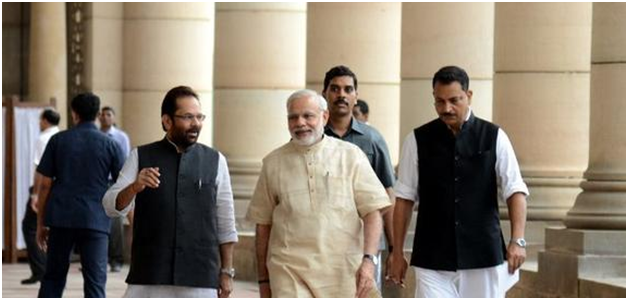3 Muslims in PM Modi's Council of Ministers: A Remarkable Show of Loyalty

NEW DELHI: Clearly a great deal of thought had gone into Prime Minister Narendra Modi’s first Cabinet reshuffle, where he had to make do with a paucity of talent, and yet send out messages that he and BJP President Amit Shah wanted to make sure reached the party.
Of these, just two messages are significant. The others, of targeting UP through the choice of some Ministers, or working on the Patel community in Gujarat are at best cosmetic and good pad-ups for media reportage.
The first message is that power now lies with PM Modi and BJP President Amit Shah, who after a slight setback in Delhi and Bihar, is back in form after the victory in Assam. These two remain as the first and last word in the BJP and government, with of course the RSS being part of the overall decision making. There is no third any longer.
And secondly, the Prime Minister has no time for stars and celebrities. Ministers are expected to work quietly, as part of his team, with Smriti Irani, Arun Jaitley, and even Piyush Goyal learning this the hard way. Irani was dropped to a smaller ministry, Jaitley pruned of Information and Broadcasting, and Goyal not brought into the cabinet after the numerous media reports suggesting that he was the new rising star.
In the midst of this, PM Modi has added to the Muslim presence by including senior journalist, former Congress spokesperson, one time Lok Sabha MP and now BJPs Rajya Sabha MP M.J.Akbar in the Council of Ministers. He has retained two 75+ Ministers, Kalraj Mishra as he does not want him to create any trouble in Uttar Pradesh before the elections, and interestingly Najma Heptullah. The third Muslim is the trusted Mukhtar Abbas Naqvi who has been with the BJP for most of his political career, and is now a trusted deputy.
All three have proven their loyalty at different points in time perhaps, but more so over the past two years. Naqvi, as this reshuffle has shown, has probably reached the zenith of his prowess in the Modi government and remains where he was earlier, more trusted than the others, and certainly seen as competent enough to tackle parliamentary affairs where he is minister of state.
But there is a lot more in common between new minister Akbar and Heptullah than is visible at first glance.Akbar is now Minister of state for External Affairs, while Heptullah continues as the Minister of state for Minority Affairs.
- Both were Congress members and MPs.
- Both left the party because of their open differences with Congress president Sonia Gandhi who was not particularly keen to give them key berths in either the organisation or the government. Heptullah was always more vocal in her resentment, speaking openly against the Congress president.
- Both started wooing the BJP during the term of Prime Minister Atal Bihari Vajpayee. Unlike Akbar who was still looking for a fig leaf of secular support for a Rajya Sabha seat, Heptullah had no such compunctions and joined the party happily.
- Heptullah was not carrying anti-Modi baggage and was made a Minister in the first instance. Her importance now lies in her ability to demonstrate her control over the Minorities Commission and ensure that independent reports on communal violence incidents in the country are not brought out. The extension, that she was worried about getting, shows that she is doing a good job in shifting the attention of the Commission to more trivial issues. Akbar will now be the Muslim face of the Modi government in Muslim countries, as well as in the world sceptical about the condition of the minorities in India under the BJP. Articulate and well versed in international affairs he is expected to serve as an asset for PM modi in the exercise of his foreign policy.
- And finally, both are staunch loyalists, have no base of their own and clear about toeing the line and the limits set by PM Modi for his Ministers. All have worked hard to prove their loyalty, making sure that not a word was said, or a statement made that could jeopardise their political future with the BJP.
None of the three, Naqvi included, have a following now amongst the Muslims, are Lone Wolves who have spent the past two years in particular proving their loyalty to PM Modi. Of the three, the going has probably been most difficult for journalist Akbar who was not seen as a friend by the Prime Minister or by Shah, even though he had built bridges with the Vajpayee government through then National Security Advisor Brajesh Mishra.



